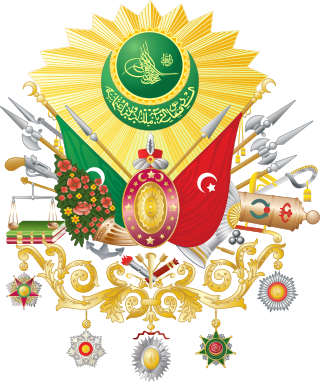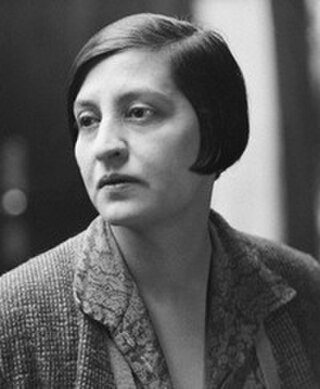
The Armenian genocide was the systematic destruction of the Armenian people and identity in the Ottoman Empire during World War I. Spearheaded by the ruling Committee of Union and Progress (CUP), it was implemented primarily through the mass murder of around one million Armenians during death marches to the Syrian Desert and the forced Islamization of others, primarily women and children.

The Turkish War of Independence was a series of military campaigns and a revolution waged by the Turkish National Movement, after parts of the Ottoman Empire were occupied and partitioned following its defeat in World War I. It resulted in the collapse of the Ottoman Empire, the abolition of the Turkish monarchy and of the Islamic Caliphate, and declaration of the Republic of Turkey in Anatolia and Eastern Thrace. The conflict was between the Turkish Nationalists against Allied and separatist forces over the application of Wilsonian principles, especially national self-determination, in post-war Anatolia and Eastern Thrace. In addition, it resulted in a transfer of vested sovereignty from the sultan-caliph to the nation, setting the stage of Republican Turkey's period of radical reform.

The culture of the Ottoman Empire evolved over several centuries as the ruling administration of the Turks absorbed, adapted and modified the various native cultures of conquered lands and their peoples. There was influence from the customs and languages of nearby Islamic societies, while Persian culture had a significant contribution through the Seljuq Turks, the Ottomans' predecessors. Despite more recent amalgamations, the Ottoman dynasty, like their predecessors in the Sultanate of Rum and the Seljuk Empire were influenced by Persian culture, language, habits and customs. Throughout its history, the Ottoman Empire had substantial subject populations of Orthodox subjects, Armenians, Jews and Assyrians, who were allowed a certain amount of autonomy under the millet system of the Ottoman government, and whose distinctive cultures were adopted and adapted by the Ottoman state.

At the 1906 Summer Olympics in Athens, an unofficial football event was held. Only four teams competed, with three of them being clubs from Greece and the Ottoman Empire. Medal tables list the gold medalist as Denmark, with the silver and bronze medalists as Turkey.

Halide Edib Adıvar was a Turkish novelist, teacher, and a feminist intellectual. She was best known for her novels criticizing the low social status of Turkish women and what she saw from her observation as the lack of interest of most women in changing their situation. She was a Pan-Turkist and several of her novels advocated for the Turanism movement.

The Greek genocide, which included the Pontic genocide, was the systematic killing of the Christian Ottoman Greek population of Anatolia which was carried out mainly during World War I and its aftermath (1914–1922) on the basis of their religion and ethnicity. It was perpetrated by the government of the Ottoman Empire led by the Three Pashas and by the Government of the Grand National Assembly led by Mustafa Kemal Atatürk, against the indigenous Greek population of the Empire. The genocide included massacres, forced deportations involving death marches through the Syrian Desert, expulsions, summary executions, and the destruction of Eastern Orthodox cultural, historical, and religious monuments. Several hundred thousand Ottoman Greeks died during this period. Most of the refugees and survivors fled to Greece. Some, especially those in Eastern provinces, took refuge in the neighbouring Russian Empire.

The deportation of Armenian intellectuals is conventionally held to mark the beginning of the Armenian genocide. Leaders of the Armenian community in the Ottoman capital of Constantinople, and later other locations, were arrested and moved to two holding centers near Angora. The order to do so was given by Minister of the Interior Talaat Pasha on 24 April 1915. On that night, the first wave of 235 to 270 Armenian intellectuals of Constantinople were arrested. With the adoption of the Tehcir Law on 29 May 1915, these detainees were later relocated within the Ottoman Empire; most of them were ultimately killed. More than 80 such as Vrtanes Papazian, Aram Andonian, and Komitas survived.
Homenetmen is a pan-Armenian diaspora organization devoted to sport and scouting. The motto of Homenetmen is "Rise and Raise".

Apollon Smyrnis Football Club is a professional football club based in Athens, Greece, which competes in the Greek Gamma Ethniki.
Football is the most popular sport in Greece, followed by basketball.
Football was introduced to the Ottoman Empire by Englishmen living in the area. The first matches took place in Selanik, now known as Thessaloniki, in 1875. F.C. Smyrna was the first football club established in Turkey. The same men brought football from İzmir to Istanbul in 1895. The first competitive matches between İzmir and Istanbul clubs took place in 1897, 1898, 1899, and 1904. The İzmir team won every match.
After World War I, the effort to prosecute Ottoman war criminals was taken up by the Paris Peace Conference (1919) and ultimately included in the Treaty of Sèvres (1920) with the Ottoman Empire. The Ottoman government organized a series of courts martial in 1919–1920 to prosecute war criminals, but these failed on account of political pressure. The main effort by the Allied administration that occupied Constantinople fell short of establishing an international tribunal in Malta to try the so-called Malta exiles, Ottoman war criminals held as POWs by the British forces in Malta. In the end, no tribunals were held in Malta.
Football is the most popular sport in Armenia.

Panionios G.S.S., the Pan-Ionian Gymnastics Club of Smyrna, is a Greek multi-sport club founded in 1890. Originally based in Smyrna/Izmir, the club was uprooted in the population exchange between Greece and Turkey following the Asia Minor Catastrophe in 1922. It is now based in the suburban town of Nea Smyrni, located in the Athens agglomeration, and where many of the refugees from Smyrna settled.

Ottoman Greeks were ethnic Greeks who lived in the Ottoman Empire (1299–1922), much of which is in modern Turkey. Ottoman Greeks were Greek Orthodox Christians who belonged to the Rum Millet. They were concentrated in eastern Thrace, and western, central, and northeastern Anatolia. There were also sizeable Greek communities elsewhere in the Ottoman Balkans, Ottoman Armenia, and the Ottoman Caucasus, including in what, between 1878 and 1917, made up the Russian Caucasus province of Kars Oblast, in which Pontic Greeks, northeastern Anatolian Greeks, and Caucasus Greeks who had collaborated with the Russian Imperial Army in the Russo-Turkish War of 1828–1829 were settled in over 70 villages, as part of official Russian policy to re-populate with Orthodox Christians an area that was traditionally made up of Ottoman Muslims and Armenians.

Holy See–Turkey relations are foreign relations between the Holy See and Turkey. Both countries established diplomatic relations in 1868, originally between the Holy See and the Ottoman Empire. The Holy See has a nunciature in Ankara. Turkey has an embassy in Rome.
Marmnamarz, published between 1911 and 1914, was one of the first sport magazines in the Ottoman Empire. The magazine was established by Shavarsh Krissian who also edited it. The first issue appeared in February 1911. Published monthly in Armenian language the magazine offered an additional incentive for extending the interest towards the sport among the Ottoman Armenians.

Shavarsh Krissian was an athlete, writer, publicist, journalist, educator, and editor of Marmnamarz, the first sports magazine of the Ottoman Empire. He is considered one of the founders of the Armenian Olympics and the Homenetmen Armenian sports organization. He was a victim of the Armenian genocide.

Vahram Papazyan was an Armenian athlete. He was one of two athletes that represented the Ottoman Empire's first official appearance in the Olympic Games. Vahram Papazyan, along with fellow Armenian Mıgırdiç Mıgıryan, were the only two athletes who represented the empire in the country's first official participation of the Olympics. Papazyan participated in Men's 800 metres and Men's 1500 metres.
The following is a list of squads for each team competing in men's football at the 1906 Intercalated Games in Athens.












